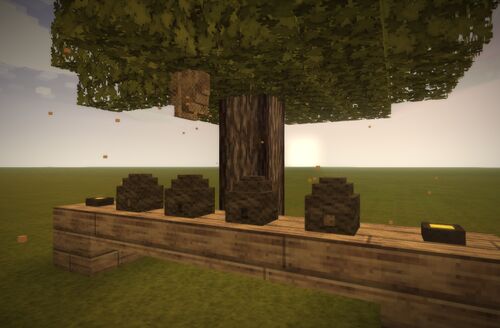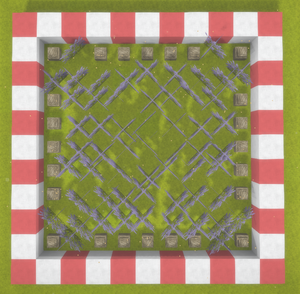Beekeeping/de: Difference between revisions
(Created page with "== Wilde Bienen Finden ==") |
|||
| Line 4: | Line 4: | ||
[[File:Beekeping.jpg|500px|thumb|Vier Bienenkörbe auf einem Tisch. Das braune Objekt unter dem Baum ist ein wilder Bienenstock.]] | [[File:Beekeping.jpg|500px|thumb|Vier Bienenkörbe auf einem Tisch. Das braune Objekt unter dem Baum ist ein wilder Bienenstock.]] | ||
== | == Wilde Bienen Finden == | ||
Finding wild [[bees]] can be difficult. Wild bees are a rare spawn in warm climates, but they don't spawn in climates that are too arid or too wet. The best way to find them is to turn the game sound all the way up and wander around in forested areas. Bees are often heard before they are seen. Keep listening for bees, and checking the trees in the area. Wild hives can be inside or suspended from a log. | Finding wild [[bees]] can be difficult. Wild bees are a rare spawn in warm climates, but they don't spawn in climates that are too arid or too wet. The best way to find them is to turn the game sound all the way up and wander around in forested areas. Bees are often heard before they are seen. Keep listening for bees, and checking the trees in the area. Wild hives can be inside or suspended from a log. | ||
Revision as of 12:06, 16 March 2020
Bienen liefern wichtige Ressourcen in Vintage Story. Mit einfachen Mitteln können Bienen gepflegt und ihre Erzeugnisse gesammelt werden.
Wilde Bienen Finden
Finding wild bees can be difficult. Wild bees are a rare spawn in warm climates, but they don't spawn in climates that are too arid or too wet. The best way to find them is to turn the game sound all the way up and wander around in forested areas. Bees are often heard before they are seen. Keep listening for bees, and checking the trees in the area. Wild hives can be inside or suspended from a log.
Capturing Wild Bees
Bees are captured using a skep. Players can view the size of the hive, number of flowers in range, and an estimate for the number of days until the hive swarms by pressing 'B' (block info) and mousing over the hive. The wild hive must reach a large population before it will divide and populate the skep.
Populating an empty skep
Place an empty skep within seven blocks of the wild beehive. If there are no flowers near the wild hive, the population will not increase enough to split. To increase the population, bees require at least five Flowers within seven blocks of the wild hive. Bees must explore their area to locate and feed on any newly placed flowers, but they will find these flowers over time.
Transporting a filled skep
Filled skeps can be transported in an empty bag (portable container) slot. Once populated, pick up the skep (right mouse button). It will be placed into the empty bag slot and can be carried home. Don't break the skep (left mouse button), as this will destroy the skep and might spawn a swarm of angry bees.
Replacing a filled skep
Place the populated skep in a prepared "apiary". To select the skep, hold Sprint (Ctrl) and scroll with the mouse wheel until the skep (in the portable container slot) is selected. While highlighted in the container slot, the populated skep can be placed on a solid surface using right mouse button.
Apiary
Bees search a range of seven blocks and need [5+3 X [number of other skeps within range] flowers] to reach a large population. Well fed populations of bees can be split to fill additional skeps, or harvested when mature.
Propagating bee populations
Additional skeps can be filled from the original, allowing players to increase the number of skeps available for harvesting. Bees transfer to empty skeps placed within 7 blocks of a filled skep, as capturing bees from a wild hive. As the population of the original skep grows, the bees will divide to populate nearby empty skep.
Harvesting skeps
As the bee population increases they produce more honeycomb. Over time the entrance of the skep will turn from a dull yellow to a bright yellow as the skep fills. When a player examines the populated skep, the block information will show that the skep has become "harvestable". At this point, breaking the skep (left mouse button) will provide honeycomb and some of the cattails used to make the skep. Pick up the harvested items and move out of the area.
Angry Bees
Though bees can be collected from the wild, they cannot be domesticated. There is always a chance that breaking the skep will spawn an angry bee swarm. One technique to avoid attacks from the angry swarm is to place straw dummies near the hives so the bees attack the decoys instead of players. If a player remains in the area of an angry swarm, bees may still attack even if a straw dummy is present. Also, make sure the skeps are not placed near animal pens, as angry bees will attack any nearby living thing, including the animals players are currently domesticating.
Honey & Wax
Honeycomb can be processed into honey and wax. First, place an empty fired bowl or bucket on the ground. Next, while holding the honeycomb, aim the cursor at the empty bowl or bucket and right click to "squeeze" the honey from the comb. This action will fill the bowl or bucket with honey and the remaining wax will appear in the player's inventory. Each honeycomb yields 0.25 liters of honey and one wax. A bowl holds honey from one honeycomb portion, while a bucket holds honey from 40 honeycombs.
When eaten, Honey restores 0.5 health points, and can also be used to make jam, added to meals like porridge, or to craft healing poultices. Wax (stacks to 32) can be used to seal food crocks for long term food preservation, and crafted into a candles by placing three wax in a column in the crafting grid. Candles never burn out and can be placed on top of solid blocks or in chandeliers. Up to 9 candles can be placed on the same block and each candle added to the block increases the light level. Candles are also used to craft lanterns.
| {{{title}}} | |
|---|---|

